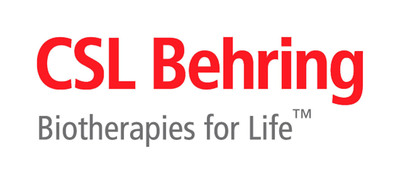SAN FRANCISCO, July 30, 2014 /PRNewswire/ -- A study presented at the 2014 World Transplant Congress evaluated the safety and efficacy of CSL Behring's C1 Inhibitor (C1-INH) concentrate in preventing antibody-mediated rejection following kidney transplants in highly sensitized patients. C1-INH is a human protein and an important inhibitor of the complement system.

The study shows that post-transplant treatment with C1-INH results in significant increases in the levels of complement components 3 and 4, suggesting that C1-INH inhibits activation of the complement system following transplantation. Antibody-mediated rejection is a major cause of kidney transplant failure and is often associated with activation of complement, a set of proteins that work with antibodies and play a role in the development of inflammation and tissue damage.
"Antibody-mediated rejection is a severe form of rejection that can occur in patients who have undergone a kidney transplant," said Stanley C. Jordan, M.D., Kidney Transplant, Cedars-Sinai Medical Center in Los Angeles, and one of the study's investigators. "Our findings provide additional insight into how C1-INH affects complement activation and represent an important advance in the study of complement-targeting therapeutics."
The placebo-controlled, single-center study evaluated 20 highly sensitized patients, meaning they already had antibodies against donor organs. Subjects were randomized to receive either placebo or 20 IU/kg of C1-INH, administered intra-operatively, then twice a week for seven additional doses. Patients were desensitized with immunoglobulin and rituximab, decreasing the patient's antibody levels prior to transplant.
According to study findings, fewer patients who were administered C1-INH developed serious adverse events compared to those administered placebo (20 percent versus 30 percent). C1-INH function and antigen levels in blood increased with C1-INH treatment [C1 function (p=0.0007) and C1-INH antigen percent (p=0.013)]. Patients treated with C1-INH experienced increased C3 levels on day 30 (p=0.005), while C4 levels were significantly higher at all time points. During the study period, no patient treated with C1-INH developed antibody-mediated rejection. Twenty percent of patients developed antibody-mediated rejection following the study period. Thirty percent of patients treated with placebo developed antibody-mediated rejection, ten percent during the study period.
This Investigator-Initiated Research study was supported by CSL Behring.
About Antibody-Mediated Rejection
Antibody-mediated rejection is a major cause of kidney transplant failure and a prime barrier to improving long-term outcomes for transplant patients. The types of antibody-mediated rejection vary in acuity and severity. Approximately 10 to 15 percent of kidney recipients experience rejection within one year after transplantation.
About CSL Behring
CSL Behring is a leader in the plasma protein therapeutics industry. Committed to saving lives and improving the quality of life for people with rare and serious diseases, the company manufactures and markets a range of plasma-derived and recombinant therapies worldwide.
CSL Behring therapies are used around the world to treat coagulation disorders including hemophilia and von Willebrand disease, primary immune deficiencies, hereditary angioedema and inherited respiratory disease, and neurological disorders in certain markets. The company's products are also used in cardiac surgery, organ transplantation, burn treatment and to prevent hemolytic diseases in the newborn. CSL Behring is a subsidiary of CSL Limited, a biopharmaceutical company with headquarters in Melbourne, Australia. For more information, visit www.cslbehring.com. CSL Behring operates one of the world's largest plasma collection networks, CSL Plasma.
Contact:
Greg Healy
CSL Behring
Office: 610-878-4841
Mobile: 610-906-4564
Greg.Healy@cslbehring.com
Logo - http://photos.prnewswire.com/prnh/20100914/PH63692LOGO
SOURCE CSL Behring




